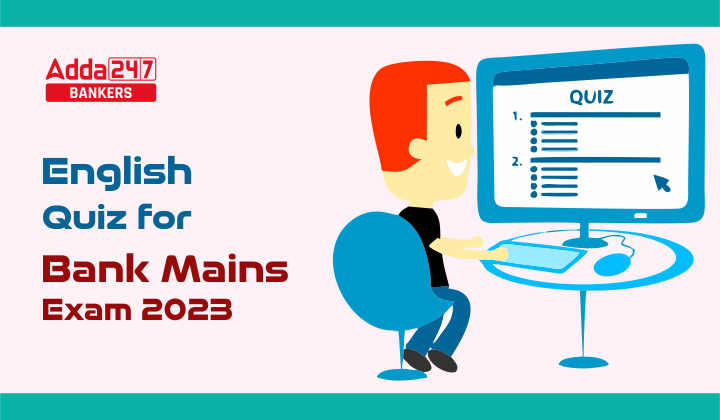Directions (1-5): Read the following passage carefully and answer the questions given below it. Certain parts are given in bold to answer some of the questions based on the passage.
“It was the best of times, it was the worst of times.” Charles Dickens’ memorable phrase perfectly describes the world of today. Health and science have advanced as never before. Yet health systems in many countries remain ill-equipped to combat the ongoing COVID-19 outbreak. We are interconnected more than ever through digital platforms. But the online glue that binds us together virtually has – ironically – sown and amplified real-life divisions, even hatred. There are many casualties in this challenging global scenario – truth, compassion, basic decency. And, not least, human rights and gender equality.
These twin pillars have underpinned landmark global frameworks ever since the founding of the United Nations itself 75 years ago – from the UN Charter of 1945 and the Universal Declaration of Human Rights of 1948, all the way to the Programme of Action that emerged from the 1994 International Conference on Population and Development (ICPD) in Cairo and, a year later, the Platform for Action from the Fourth World Conference on Women in Beijing. The collective and complementary vision of all of these guide the 2030 Agenda for Sustainable Development and its Sustainable Development Goals, including Gender Equality. Yes, gains have been made on several fronts globally, including in Asia and the Pacific, in recent decades.
But efforts to advance ICPD, the Beijing Platform and the SDGs are under sustained and concerted attack on multiple fronts in this age of escalating conservatism. The very concept of gender equality is under threat – and “gender” more than ever serves as a rallying cry for those who would perpetuate patriarchy, sexism and harmful practices against women at multiple levels of government and civil society. These attacks take aim as well at the rights and well-being of individuals of diverse sexual identities, those living with disabilities and indigenous peoples – groups that have long been marginalized and excluded by society.
We need governments to demonstrate genuine leadership and be held accountable – with ICPD, Beijing and the SDGs as the yardsticks to be measured and judged by. We need civil society and communities to be empowered and ever bolder and courageous, to do what is right for women and girls around the world. The #MeToo movement to combat sexual harassment, for example, has gained global traction, but far too many voices remain silenced. We need to forge a coalition of those who are already champions and those that still need to be convinced by enabling genuine dialogue – using our interconnected, online environment to unite, not divide.
We need robust, disaggregated data on women’s rights and gender equality to reveal where needs are the greatest, and ensure the inclusion of those furthest behind. The kNOwVAWdata Asia-Pacific initiative, gathering data on the prevalence of violence against women to spur governments to act, is a strong example. We need to always remember that __________(I)_________. Without human rights, there will simply be no gender equality or women’s empowerment – and without gender equality, there can be no realization of human rights. Twenty-five years after ICPD and the Beijing Platform for Action, let’s remain true to the ideals of the remarkable frameworks that were, after all, crafted collectively by countries themselves. Talk is cheap. Gender equality, women’s rights and human rights cannot be values we simply aspire to, but must be regarded as the very foundations that ground humanity itself. These must serve as our collective lodestar, as we navigate this decade of action on the SDGs to a better future for all.
Q1. The repercussions of supporting the ideas that are against the notions of gender equality are-
(a) ordinary individuals fall prey to any discrimination that exists within the society
(b) policies which usually prohibit rights of women become a usual norm
(c) prerogatives of individuals who are usually treated insignificant are targeted
(d) both (a) and (c)
(e) all are correct
Q2. Which of the following have been considered “twin pillars” by the author which have been frequently undermines for years?
(a) human rights which guarantee gender equality
(b) truth and compassion
(c) gender equality and human rights
(d) basic decency and elimination of gender based inequality
(e) none of these
Q3. Which of the following is not true in context of the information given in the passage?
(a) Notwithstanding the developments within the field of health, many countries are still grappling to tackle COVID-19 pandemic.
(b) The goals laid down at prominent events and in charters are being jeopardized in the times where people are opposing any changes.
(c) The data on women’s rights can help investigate the areas where the need for improvement is widely required
(d) Both (a) and (c)
(e) All are correct
Q4. How does the writer suggests to counter damaging consequences of not being able to ensure gender equality?
(a) The government must emerge as the frontrunner
(b) The role of civil societies must be enhanced
(c) Establish cooperation between the trailblazers and those who aren’t certain for the cause
(d) both (a) and (b)
(e) all are correct
Q5. The primary idea of the given passage is-
(a) Women’s crucial role in peace and security is often overlooked
(b) Women human rights defenders are ostracized by their communities and seen as a threat
(c) There can be no human rights without gender equality
(d) Economic and social discrimination results in fewer and poorer life choices for women
(e) all are correct
Solutions
S1. Ans. (c)
Sol. To validate the answer, refer to the third paragraph, which mentions, “These attacks take aim as well at the rights and well-being of individuals of diverse sexual identities, those living with disabilities and indigenous peoples – groups that have long been marginalized and excluded by society.” Referring to the quoted text, we can infer that the statement given in option (c) is correct in context of the given question.
S2. Ans. (c)
Sol. Among the given options, the author makes the mention of twin pillars for “gender equality and human rights”. Hence, option (c) is the most suitable answer choice.
S3. Ans. (e)
Sol. None of the given statements is incorrect as per the information available in the passage. Hence, option (e) is the most suitable answer choice.
Option (a) [Paragraph 1]: “Health and science have advanced as never before. Yet health systems in many countries remain ill-equipped to combat the ongoing COVID-19 outbreak.”
Option (b) [Paragraph 3]: “But efforts to advance ICPD, the Beijing Platform and the SDGs are under sustained and concerted attack on multiple fronts in this age of escalating conservatism.”
Option (c) [Paragraph 5]: “We need robust, disaggregated data on women’s rights and gender equality to reveal where needs are the greatest, and ensure the inclusion of those furthest behind.”
S4. Ans. (e)
Sol. To validate the answer, refer to the fourth paragraph of the above passage, which mentions, “We need governments to demonstrate genuine leadership and be held accountable; We need civil society and communities to be empowered and ever bolder and courageous; We need to forge a coalition of those who are already champions and those that still need to be convinced by enabling genuine dialogue.” Referring to the quoted text, we can infer that the statements given in options (a), (b) and (c) are correct in context of the given question. Hence, option (e) is the most suitable answer choice.
S5. Ans. (c)
Sol. Among the given statements, the statement given in option (c) well defines the primary idea of the passage. It can also be corroborated from the last passage of the paragraph, which mentions, “Without human rights, there will simply be no gender equality or women’s empowerment – and without gender equality, there can be no realization of human rights…..Gender equality, women’s rights and human rights cannot be values we simply aspire to, but must be regarded as the very foundations that ground humanity itself”. Hence, option (c) is the most suitable answer choice.





 English Language Quiz For Bank Foundatio...
English Language Quiz For Bank Foundatio...
 English Language Quiz For Bank Mains Exa...
English Language Quiz For Bank Mains Exa...





